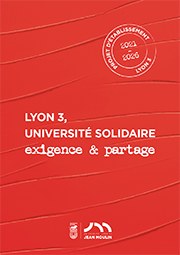AccueilRechercheLes productions scientifiquesThèsesThèses soutenuesThèses soutenues - 2006-2020Thèses soutenues - 2011
-
Partager cette page
- Recherche,
FARRE-MALAVAL Margerie
Les rappoprts juridiques entre sécurité maritime et protection du milieu marin : essai sur l'émergence d'une sécurité maritime environnementale en droit international et de l'union européenne.
Publié le 21 octobre 2011 – Mis à jour le 21 octobre 2011
Thèse en Droit -Droit communautaire soutenue le 12 octobre 2011
Débutée par l’étude des règles communautaires engendrées par le naufrage de l’Erika, la présente recherche s’est affinée autour de la relation entre sécurité maritime et protection du milieu marin tout en s’enrichissant de l’observation des règles internationales. Dès lors, l’idée retenue fut d’étudier la collision entre deux éléments ni équivalents, ni complètement différents et de voir ce que ce « big-bang » juridique avait pu provoquer.
La première partie envisagera le renouvellement de la fonction de sécurité maritime autour de la finalité de protection du milieu marin. En effet, vers le milieu du XXème siècle, l’apparition des préoccupations environnementales vient déséquilibrer la répartition classique des compétences entre l’Etat du pavillon et l’Etat côtier. La liberté, principe fondateur de l’ordre des mers, se transforme pour s’adapter aux réalités de la protection du milieu marin. Elle devient alors le principe d’utilisation durable de la mer, nouvelle clé de la répartition des souverainetés en mer. Une forme de gouvernance environnementale de la sécurité maritime paraît se constituer autour de l’Organisation maritime internationale et de l’Union européenne
La seconde partie permettra de mettre en lumière la redéfinition de l’espace normatif de sécurité maritime au prisme de l’objectif de prévention des pollutions. A l’origine, les règles de sécurité maritime avaient pour but de protéger l’entreprise maritime contre les dangers de la mer. Désormais, il s’agit de protéger la biosphère pour sauvegarder l’humanité et ses générations futures. C’est pourquoi la sécurité maritime classique, devenue insuffisante, évolue vers une notion plus moderne, « environnementale ».
Begun with the study of the European Union rules engendered by the wreck of Erika, the present research was refined around the relation between marine safety and marine environment protection while growing rich of the observation of the international rules. From then on, the idea was to study the collision between two elements neither equivalents, nor completely different and to see what this legal "big-bang" had provoke.
The first part will envisage the renewal of the function of marine safety around the purpose of marine environment protection. Indeed, by the middle of the XXth century, the appearance of the environmental concerns comes to destabilize the classic distribution of the skills between the flag State and the coastal State. The freedom, founding principle of the order of seas, has been transformed to adapt itself to the realities of the marine environment protection. It becomes then the principle of sustainable use of the sea, the new key of the distribution of sovereignties on the sea. A shape of environmental governance of the maritime safety appears to establish around the International Maritime Organization and the European Union.
The second part will allow to bring to light the redefining of the normative space of maritime safety in the prism of the objective of prevention of the pollutions. Originally, the regulations of marine safety aimed at protecting the sailormen against the dangers of the sea. Henceforth, it is today a question of protecting the biosphere, the humanity and its future generations. That is why the classic marine safety, become insufficient, evolves towards a more modern, " environmental " notion.
Mots-clefs : Sécurité Maritime, Protection du milieu marin, Droit international, Droit de l’Union européenne, Droit de la mer, Droit maritime, Droit de l’environnement, Etat du pavillon, Etat côtier, Libre immatriculation, Juridiction rampante, Protection intégrée, Gouvernance environnementale, Pollutions accidentelles, Pollutions opérationnelles, Responsabilité, Effectivité des règles, Erika, Prestige
Key words : Marine Safety, Marine Environment Protection, International Law, European Union Law, Law of the Sea, Maritime Law, Environment Law, Flag State, Coastal State, Flag of convenience, Creeping Jurisdiction, Integrated Environmental Protection, Environmental Governance, Accidental Pollution, Operational Pollution, Responsability, Law Enforcement, Erika, Prestige
Directeur de thèse : Stéphane DOUMBE-BILLE
Membres du jury :
Marc BLANQUET, Professeur, Université de Toulouse 1
Tullio SCOVAZZI, Professeur, Université de Milano-Bicocca, Italie
Stéphane DOUMBE-BILLE, Professeur, Université Jean Moulin Lyon 3
Alain PIQUEMAL, Professeur, Université de Nice Sofia Antipolis
Thierry DEBARD, Professeur, Université Jean Moulin Lyon 3
Président du jury : Alain PIQUEMAL
Mention : Très honorable
Equipe d'accueil : CDI
La première partie envisagera le renouvellement de la fonction de sécurité maritime autour de la finalité de protection du milieu marin. En effet, vers le milieu du XXème siècle, l’apparition des préoccupations environnementales vient déséquilibrer la répartition classique des compétences entre l’Etat du pavillon et l’Etat côtier. La liberté, principe fondateur de l’ordre des mers, se transforme pour s’adapter aux réalités de la protection du milieu marin. Elle devient alors le principe d’utilisation durable de la mer, nouvelle clé de la répartition des souverainetés en mer. Une forme de gouvernance environnementale de la sécurité maritime paraît se constituer autour de l’Organisation maritime internationale et de l’Union européenne
La seconde partie permettra de mettre en lumière la redéfinition de l’espace normatif de sécurité maritime au prisme de l’objectif de prévention des pollutions. A l’origine, les règles de sécurité maritime avaient pour but de protéger l’entreprise maritime contre les dangers de la mer. Désormais, il s’agit de protéger la biosphère pour sauvegarder l’humanité et ses générations futures. C’est pourquoi la sécurité maritime classique, devenue insuffisante, évolue vers une notion plus moderne, « environnementale ».
Begun with the study of the European Union rules engendered by the wreck of Erika, the present research was refined around the relation between marine safety and marine environment protection while growing rich of the observation of the international rules. From then on, the idea was to study the collision between two elements neither equivalents, nor completely different and to see what this legal "big-bang" had provoke.
The first part will envisage the renewal of the function of marine safety around the purpose of marine environment protection. Indeed, by the middle of the XXth century, the appearance of the environmental concerns comes to destabilize the classic distribution of the skills between the flag State and the coastal State. The freedom, founding principle of the order of seas, has been transformed to adapt itself to the realities of the marine environment protection. It becomes then the principle of sustainable use of the sea, the new key of the distribution of sovereignties on the sea. A shape of environmental governance of the maritime safety appears to establish around the International Maritime Organization and the European Union.
The second part will allow to bring to light the redefining of the normative space of maritime safety in the prism of the objective of prevention of the pollutions. Originally, the regulations of marine safety aimed at protecting the sailormen against the dangers of the sea. Henceforth, it is today a question of protecting the biosphere, the humanity and its future generations. That is why the classic marine safety, become insufficient, evolves towards a more modern, " environmental " notion.
Mots-clefs : Sécurité Maritime, Protection du milieu marin, Droit international, Droit de l’Union européenne, Droit de la mer, Droit maritime, Droit de l’environnement, Etat du pavillon, Etat côtier, Libre immatriculation, Juridiction rampante, Protection intégrée, Gouvernance environnementale, Pollutions accidentelles, Pollutions opérationnelles, Responsabilité, Effectivité des règles, Erika, Prestige
Key words : Marine Safety, Marine Environment Protection, International Law, European Union Law, Law of the Sea, Maritime Law, Environment Law, Flag State, Coastal State, Flag of convenience, Creeping Jurisdiction, Integrated Environmental Protection, Environmental Governance, Accidental Pollution, Operational Pollution, Responsability, Law Enforcement, Erika, Prestige
Directeur de thèse : Stéphane DOUMBE-BILLE
Membres du jury :
Marc BLANQUET, Professeur, Université de Toulouse 1
Tullio SCOVAZZI, Professeur, Université de Milano-Bicocca, Italie
Stéphane DOUMBE-BILLE, Professeur, Université Jean Moulin Lyon 3
Alain PIQUEMAL, Professeur, Université de Nice Sofia Antipolis
Thierry DEBARD, Professeur, Université Jean Moulin Lyon 3
Président du jury : Alain PIQUEMAL
Mention : Très honorable
Equipe d'accueil : CDI
Documentation
Mise à jour : 21 octobre 2011



